In an extract from his contribution to our new anthology Roam Alone Dom Tulett, winner of Bradt’s New Travel Writer of the Year competition 2016, tells the story of his first trip away from his daughter.
Walking the dusty streets around Villa de Leyva, in the Colombian Andes, I saw in a rock wall the face of my daughter’s favourite toy.
Days later, in the coffee fields of the country’s west, her push-trike showed itself to me in a rickety wheelbarrow resting decrepit against the crumbling wall of a farmer’s ancient shack. I heard her laugh in La Candelaria.
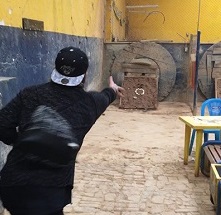
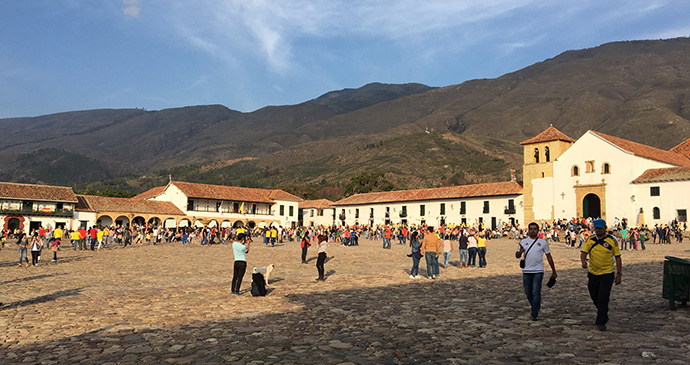
Crowds in Villa de Leyva © Dom Tulett
My first overseas work trip as a father took me away from her. It hadn’t been planned that way; a thick cold and miserable nights kept her and my wife grounded in the UK, unable to join me for my few days of work and few weeks of holiday. Our three-week stomp around Colombia – our first significant trip as a family – had thus become an exercise in watching the clock, counting down the days, pining for home. My wife stayed behind but had encouraged me on. ‘You should stay out there after work,’ she said. ‘Everything’s paid for in any case. My parents will help here. We’ll be at the airport when you get back.’
At first it felt like an opportunity, a break from the sleepless nights of home. Three weeks of exploring Colombia, with time on my hands and space in my world. But the imagined gloss quickly wore off. Before the holiday part of the trip had even begun I had lost my enthusiasm, and not even calls home could improve my mood.
I tried to fill my time in Bogotá, unhappy with the emptiness of the hotel room, but more and more moments reminded me of home and the family I had left behind. A startled bird flew from a tree and I involuntarily pointed it out with a feigned enthusiastic exclamation. I heard myself talking to no-one when I passed some colourful flowers – ‘a red flower, a pink flower’ – followed each time by their true name, spelt out slowly through the syllables: ‘a white flower – mag-no-li-a’. A fruit bowl at breakfast took me back to snack times at home, and my daughter’s glee when I’d prop an emptied banana skin on top of my head. That laugh again, that beautiful laugh; its absence haunted me as much as the empty cot standing conspicuously in the corner of the hotel room.
I wandered from my hotel in the Candelaria district to some of the nearby hostels. I found a bar and drank a beer. I watched couples whispering over flickering candles and groups laughing loudly around tables of empty beer cans. I had another beer. No-one else was sitting on their own. I looked around the walls of the bar and saw a sign-up sheet for a city bike tour the following morning. There was only one name on the sheet: Andreas Oskarsson, perhaps a fellow solo traveller. I added mine.
Andreas Oskarsson was from Sweden, tall and thin, with loose curls of brown hair and a long, narrow face. He wore stylish, thick-rimmed glasses, and constantly tilted his head to one side so that the glasses looked uneven and gave him the appearance of being either confused by everything that was said to him or of having not fully heard it. But he heard everything and he got everything.
I tried to stick close to Andreas on the ride – he was the only other solo cyclist – but it wasn’t easy. Andreas spoke to everyone. He cycled between couples to start up conversations. He would pedal into the middle of large groups of friends, picking up whatever they were talking about. I marvelled at how he always found a natural way of connecting with other people. I assumed that people would resent me for intruding, but everyone liked – and welcomed – Andreas.
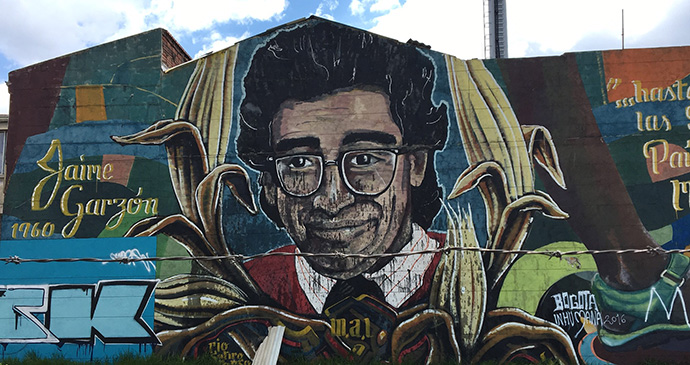
Political graffiti in Bogotá © Dom Tulett
The bike tour took us around several of Bogotá’s central neighbourhoods. We were shown murals of political graffiti, a ‘garbage museum’, which was the house of a local hermit (‘He was educated in Paris…’) with mountains of broken boots and wind chimes of splintered CDs, a coffee bar where two children danced and sang for money at the door. We stopped at a market. The guide showed us exotic fruits and offered us samples. Andreas was asking questions when my attention was stolen by a series of muffled bangs coming from deep within a café across the road. Customers were sitting calmly out front, suggesting the noises were normal. I nudged Andreas to look at the café.
The tour guide was cutting bite-sized pieces of a local passionfruit. Andreas asked him, ‘What’s going on in there?’
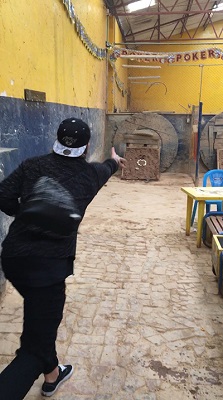 Playing tejo © Dom Tulett |
‘It is a game,’ he said. ‘Tejo. You can’t go in.’
Later that day, Andreas and I played, a cross between darts and pétanque, with gunpowder. Pressed into the centre of the soft clay game board sits an iron ring, the size of a football, with folded paper pouches propped against it. Whenever a rounded metal weight, thrown underarm down the long, narrow alley, hits one of the pouches, the gunpowder inside it explodes with a shuddering crack that rattles the walls and sends the novice player ducking for cover. My daughter would not have enjoyed this game. I asked one of the men working in the tejo alleys how much it costs to play. ‘You do not pay to play tejo. You buy a crate of beers and then you play for free.’ I thought that my wife might not have enjoyed this game either.
Villa de Leyva was crowded in the lead up to the Easter weekend. The tight cobbled streets heaved with an army of Colombians, mostly on their own breaks from the city, all dressed in bright yellow T-shirts. Fresh off the bus, I settled into a small café. An ornamental white cast-iron bicycle propped open the green slatted door, vibrant bunches of flowers blooming out of the basket.
Pink flower, purple flower. Car-na-tion.
The café was full of bright yellow T-shirts. Everyone looked at me, underdressed for the occasion, as I walked through the door, then raised their eyes back up a few degrees to resume watching the television set balanced on a crooked shelf above where I stood. I ordered a beer, wedged myself on to a small wooden stool and craned my neck to watch the football – Bolivia versus Colombia. The match was being played at a high altitude, to which the Bolivian players were accustomed. The Colombians were tiring. It was not looking good for them as the game neared its end, but through heavy legs and light lungs Colombia managed to score the winning goal in the last minute.
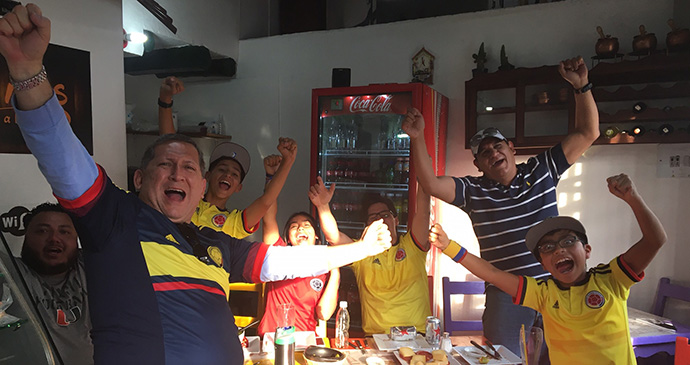
Victory for Colombia © Dom Tulett
The mood in the café, until that moment a nervous, silent, fidgety den, exploded into joy and fervour and relief. The yellow shirts welcomed me as one of their own. My appearance had changed the course of the game, apparently. Long after the final whistle we stayed and drank. Beer became wine. Wine became guaro, a rum-style drink served in tall, thin shot glasses, which never stayed empty or full for long. Afternoon became evening. Evening became hungover morning, my first in over a year.
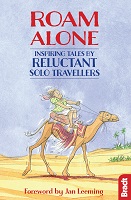
Want to read the rest of Dom’s story? Get 10% off Roam Alone: Inspiring Tales By Reluctant Solo Travellers here.